2018 年浙江温州大学英美文学考研真题
Part I Literary Identification (Read the following 10 excerpts, and identify the
names of the works and their authors. 3 points for each excerpt, and 30 points in
all.)
1. “Reading maketh a full man, conference a ready man, writing an exact man.”
2. “To be, or not to be—that is the question: / Whether ‘tis nobler in the mind
to suffer / The slings and arrows of outrageous fortune, / Or to take arms against
a sea of troubles”
3. “Almost five thousand years agone, there were Pilgrims walking to the Cœlestial
City, as these two honest persons are; and Beelzebub, Apollyon, and Legion, with
their Companions, perceiving by the path that the Pilgrims made, that their way to
the City lay through this Town of Vanity, they contrived here to set up a Fair; a
Fair wherein should be sold all sorts of Vanity, and that it should last all the
year long: therefore at this Fair are all such Merchandize sold, as Houses, Lands,
Trades, Places, Honours, Preferments, Titles, Countries, Kingdoms, Lusts, Pleasures,
and Delights of all sorts, as Whores, Bawds, Wives, Husbands, Children, Masters,
Servants, Lives, Blood, Bodies, Souls, Silver, Gold, Pearls, Precious Stones, and
what not?”
4. “My master told me there were some qualities remarkable in the Yahoos, which
he had not observed me to mention, or at least very slightly, in the accounts I had
given of humankind.” “But something always returned swift upon me to check these
thoughts, and to reprove me; and particularly one day, walking with my gun in my
hand by the seaside, I was very pensive upon the subject of my present condition,
when reason, as it were, expostulated with me the other way, thus: ‘Well, you are
in a desolate condition, it is true; but, pray remember, where are the rest of you?
Did not you come, eleven of you in the boat? Where are the ten? Why were they not
saved, and you lost? Why were you singled out? Is it better to be here or there?’
And then I pointed to the sea. All evils are to be considered with the good that
is in them, and with what worse attends them.”
5. “At a certain season of our life we are accustomed to consider every spot a
possible site of a house. I have thus surveyed the country on every side within a
dozen miles of where I live. In imagination I have bought all the farms in succession,
for all were to be bought, and I knew their price.”
6. “DURING the whole of a dull, dark, and soundless day in the autumn of the year,
when the clouds hung oppressively low in the heavens, I had been passing alone, on
horseback, through a singularly dreary tract of country, and at length found myself,
as the shades of evening drew on, within view of the melancholy House of Usher. I
know not how it was—but, with the first glimpse of the building, a sense of
insufferable gloom pervaded my spirit. I say insufferable; for the feeling was
unrelieved by any of that half-pleasurable, because poetic, sentiment, with which
the mind usually receives even the sternest natural images of the desolate or
terrible.”
�
7. “O Captain! My Captain! our fearful trip is done; / The ship has weather'd every
rack, the prize we sought is won; / The port is near, the bells I hear, the people
all exulting, / While follow eyes the steady keel, the vessel grim and daring:”
8. “Simon Wheeler backed me into a corner and blockaded me there with his chair—and
then sat down and reeled off the monotonous narrative which follows this paragraph.
He never smiled, he never frowned, he never changed his voice from the quiet,
gently-flowing key to which he turned the initial sentence, he never betrayed the
slightest suspicion of enthusiasm—but all through the interminable narrative there
ran a vein of impressive earnestness and sincerity, which showed me plainly that
so far from his imagining that there was anything ridiculous or funny about his story,
he regarded it as a really important matter, and admired its two heroes as men of
transcendent genius in finesse. To me, the spectacle of a man drifting serenely along
through such a queer yarn without ever smiling was exquisitely absurd. As I said
before, I asked him to tell me what he knew of Rev. Leonidas W. Smily, and he replied
as follows. I let him go on in his own way, and never interrupted him once:”
9. “Gatsby believed in that green light, the orgiastic future that year by year
recedes before us. It eluded us then, but that’s no matter—tomorrow we will run
faster, stretch out our arms farther…And one fine morning-- / So we beat on, boats
against the current, borne back ceaselessly into the past.”
10. “For oft, when on my couch I lie / In vacant or in pensive mood, / They flash
upon that inward eye / Which is the bliss of solitude; / And then my heart with
pleasure fills, / And dances with the daffodils.”
Part II Literary and Critical Terms (Choose FIVE terms, and explain each of them
in English in about 80 words. 6 points for each, and 30 points in all.)
1. allegory
2. narrative
3. Renaissance
4. irony
5. blank verse
6. Enlightenment
7. satire
8. point of view
9. prose
10. Sonnet
Part III Literary Analysis (Read the following 6 excerpts, and answer the questions
following each excerpt according to the requirement. 10 points for each excerpt,
and 60 points in all.)
Read the following poem and answer the questions followed.
When, in disgrace with fortune and men's eyes,
I all alone beweep my outcast state,
And trouble deaf heaven with my bootless cries,
�
And look upon myself, and curse my fate,
Wishing me like to one more rich in hope,
Featur'd like him, like him with friends possess'd,
Desiring this man's art and that man's scope,
With what I most enjoy contented least;
Yet in these thoughts myself almost despising,
Haply I think on thee, and then my state,
Like to the lark at break of day arising
From sullen earth, sings hymns at heaven's gate;
For thy sweet love remember'd such wealth brings
That then I scorn to change my state with kings.
Q1: Please translate the following two lines: “When, in disgrace with fortune and
men’s eyes, / I all alone beweep my outcast state,”
Q2. What life philosophy is expressed in the poem?
2. Read the following excerpt and answer the questions followed
In a Station of the Metro
The apparition of these faces in the crowd;
Petals on a wet, black bough
Q1. Why does the poet call the faces of pedestrians “apparition”?
Q2. What images do you find in the poem?
Q3. What do “petals” and “bough” stand for?
Q4. Which poetic techniques does the poem employ?
3. Read the following excerpt and answer the questions followed
“Within these plantations of God, a decorum and sanctity reign, a perennial festival
is dressed, and the guest sees not how he should tire of them in a thousand years.
In the woods, we return to reason and faith. There I feel that nothing can befall
me in life, — no disgrace, no calamity, (leaving me my eyes,) which nature cannot
repair. Standing on the bare ground, — my head bathed by the blithe air, and uplifted
into infinite space, — all mean egotism vanishes. I become a transparent eye-ball;
I am nothing; I see all; the currents of the Universal Being circulate through me;
I am part or particle of God. The name of the nearest friend sounds then foreign
and accidental: to be brothers, to be acquaintances, — master or servant, is then
a trifle and a disturbance. I am the lover of uncontained and immortal beauty. In
the wilderness, I find something more dear and connate than in streets or villages.
In the tranquil landscape, and especially in the distant line of the horizon, man
beholds somewhat as beautiful as his own nature.”
Q1. According to the excerpt, what is “transparent eye-ball”?
Q2. What is the function of “transparent eyeball”?
Q3. How is the notion related to American literature?
4. Read the following excerpt and answer the questions followed
Tyger Tyger, burning bright,
�
In the forests of the night;
What immortal hand or eye,
Could frame thy fearful symmetry?
In what distant deeps or skies.
Burnt the fire of thine eyes?
On what wings dare he aspire?
What the hand, dare seize the fire?
And what shoulder, & what art,
Could twist the sinews of thy heart?
And when thy heart began to beat,
What dread hand? & what dread feet?
What the hammer? what the chain,
In what furnace was thy brain?
What the anvil? what dread grasp,
Dare its deadly terrors clasp!
When the stars threw down their spears
And water'd heaven with their tears:
Did he smile his work to see?
Did he who made the Lamb make thee?
Tyger Tyger burning bright,
In the forests of the night:
What immortal hand or eye,
Dare frame thy fearful symmetry?
Q1. Who is the writer of this poem?
Q2. Which word in the poems could best describe the image of the tyger?
Q3. Which part of the tyger does “fearful symmetry” describe?
Q4. How do you explain “spears” in stanza 5?
Q5. What does “he” in stanza 5 refer to?
5. Read the following excerpt and answer the questions followed
‘My reasons for marrying are, first, that I think it a right thing for every
clergyman in easy circumstances (like myself) to set the example of matrimony in
his parish; secondly, that I am convinced it will add very greatly to my happiness;
and, thirdly, which perhaps I ought to have mentioned earlier, that it is the
particular advice and recommendation of the very noble lady whom I have the honour
of calling patroness. Twice has she condescended to give me her opinion (unasked
too!) on this subject; and it was but the very Saturday night before I left
Hunsford,—between our pools at quadrille, while Mrs. Jenkinson was arranging Miss
De Bourgh’s footstool,—that she said, “Mr. Collins, you must marry. A clergyman
like you must marry. Choose properly, choose a gentlewoman for my sake, and for your
own; let her be an active, useful sort of person, not brought up high, but able to
make a small income go a good way. This is my advice. Find such a woman as soon as
you can, bring her to Hunsford, and I will visit her.” Allow me, by the way, to
observe, my fair cousin, that I do not reckon the notice and kindness of Lady
�
Catherine de Bourgh as among the least of the advantages in my power to offer. You
will find her manners beyond anything I can describe; and your wit and vivacity,
I think, must be acceptable to her, especially when tempered with the silence and
respect which her rank will inevitably excite. Thus much for my general intention
in favour of matrimony; it remains to be told why my views were directed to Longbourn
instead of my own neighbourhood, where I assure you there are many amiable young
women. But the fact is, that being, as I am, to inherit this estate after the death
of your honoured father (who, however, may live many years longer), I could not
satisfy myself without resolving to choose a wife from among his daughters, that
the loss to them might be as little as possible when the melancholy event takes place
which, however, as I have already said, may not be for several years. This has been
my motive, my fair cousin, and I flatter myself it will not sink me in your esteem.
And now nothing remains for me but to assure you in the most animated language of
the violence of my affection. To fortune I am perfectly indifferent, and shall make
no demand of that nature on your father, since I am well aware that it could not
be complied with; and that one thousand pounds in the four per cents, which will
not be yours till after your mother’s decease, is all that you may ever be entitled
to. On that head, therefore, I shall be uniformly silent: and you may assure yourself
that no ungenerous reproach shall ever pass my lips when we are married.’
Q1. Who does “I” in the excerpt refer to?
Q2. Who is “I” addressing to?
Q3. Which factor dominates “My reasons for marrying”?
Q4. Which type of writing does the excerpt appear in?
6. Read the following excerpt and answer the questions followed
“The only house I had been the owner of before, if I except a boat, was a tent,
which I used occasionally when making excursions in the summer, and this is still
rolled up in my garret; but the boat, after passing from hand to hand, has gone down
the stream of time. With this more substantial shelter about me, I had made some
progress toward settling in the world. This frame, so slightly clad, was a sort of
crystallization around me, and reacted on the builder. It was suggestive somewhat
as a picture in outlines. I did not need to go outdoors to take the air, for the
atmosphere within had lost none of its freshness. It was not so much within doors
as behind a door where I sat, even in the rainiest weather. The Harivansa says, ‘An
abode without birds is like a meat without seasoning.’ Such was not my abode, for
I found myself suddenly neighbor to the birds; not by having imprisoned one, but
having caged myself near them.”
Q1. Who is the author of the excerpt?
Q2. Why does the author use the quotation of Harivansa?
Q3. What kind of relation between man and nature is expressed in the excerpt?
Part IV Literary Commentary (Write your commentary in English in no less than 600
words. 30 points in all.)
“Poetry, therefore, is a more philosophical and a higher thing than history: for
�
poetry tends to express the universal, history the particular.” (Aristotle,
Poetics). Do you agree or not? Illustrate your points with examples from your reading
of English and American literature.
�
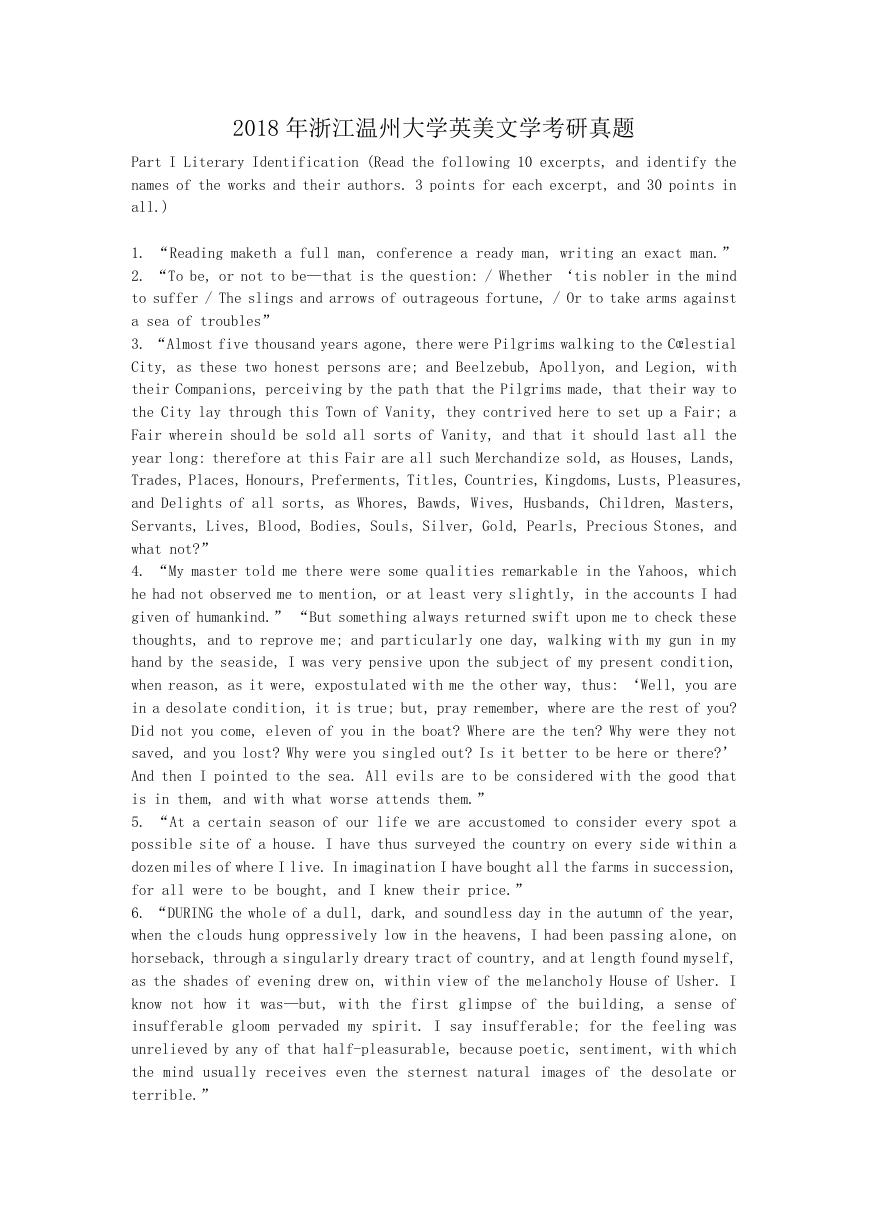
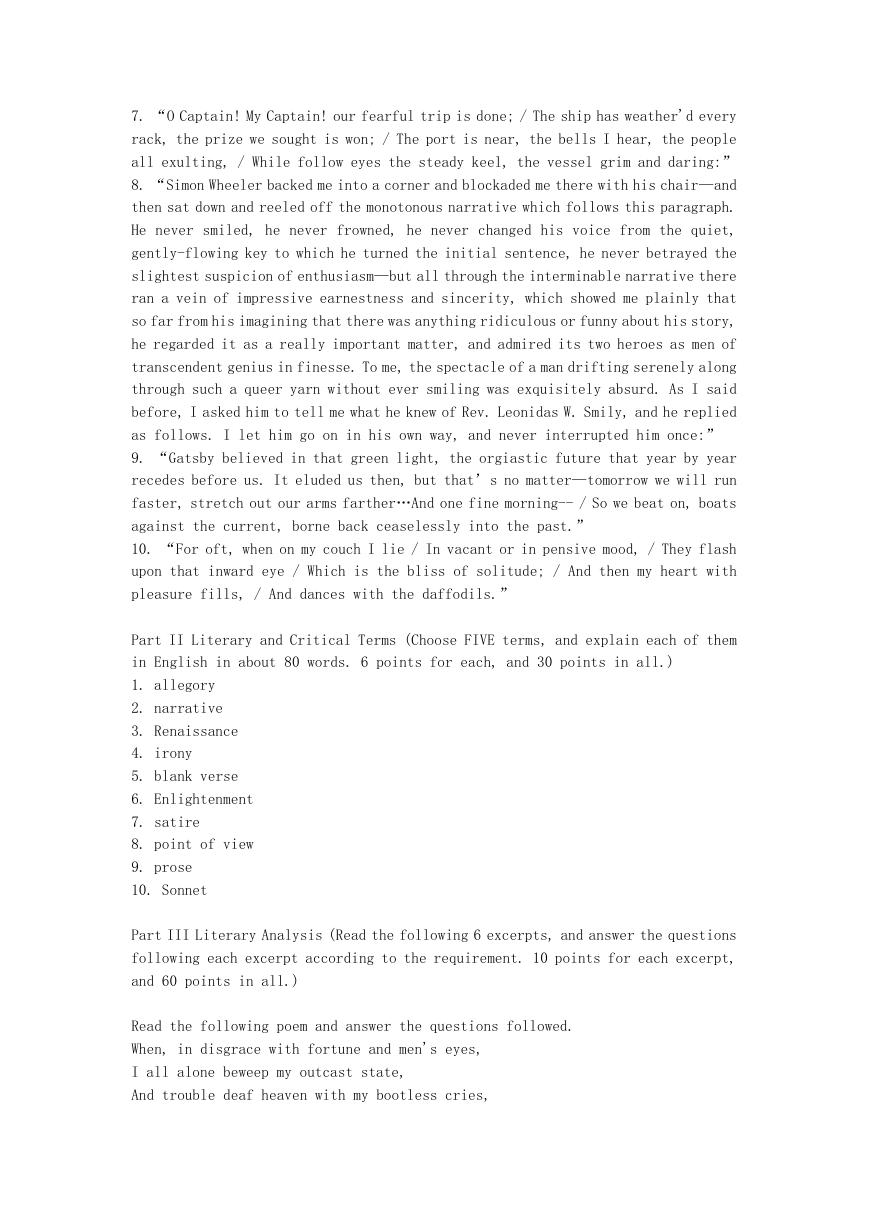
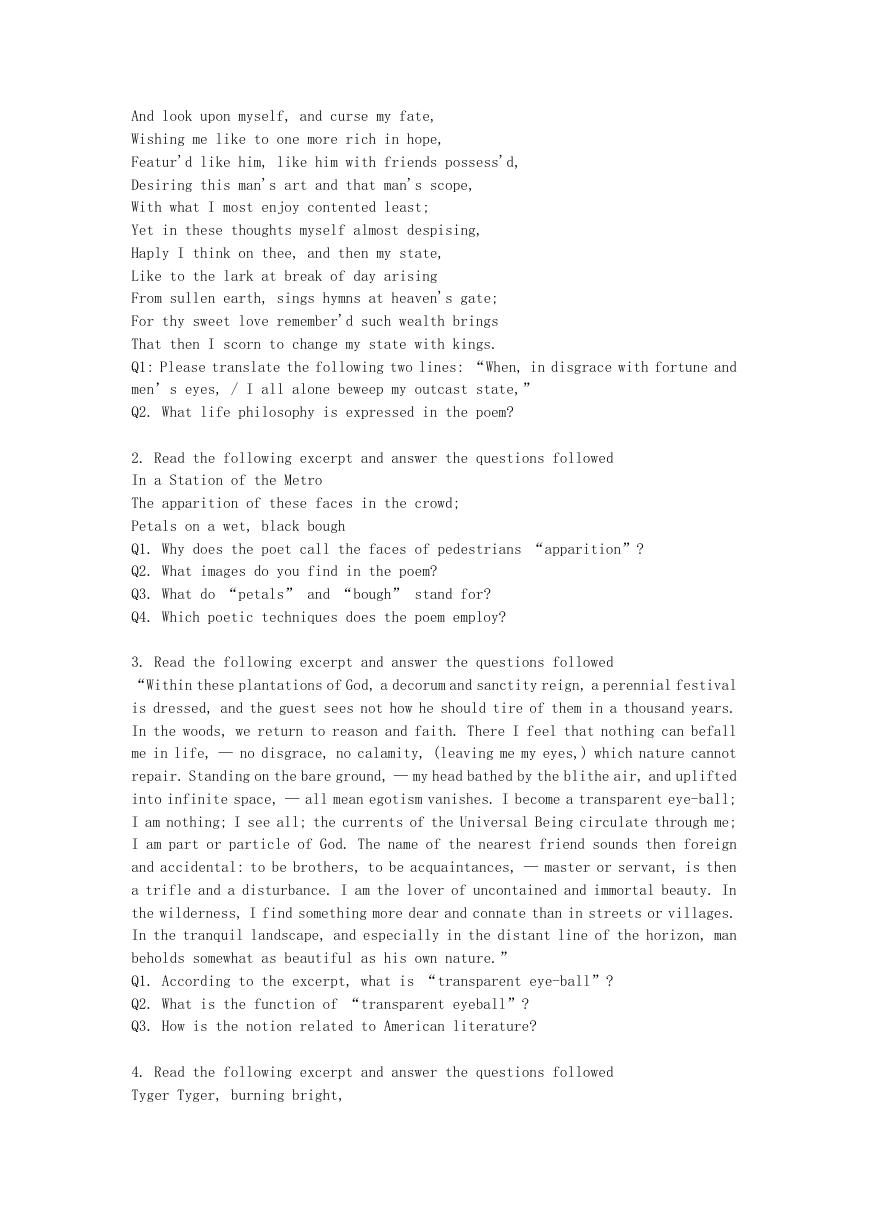
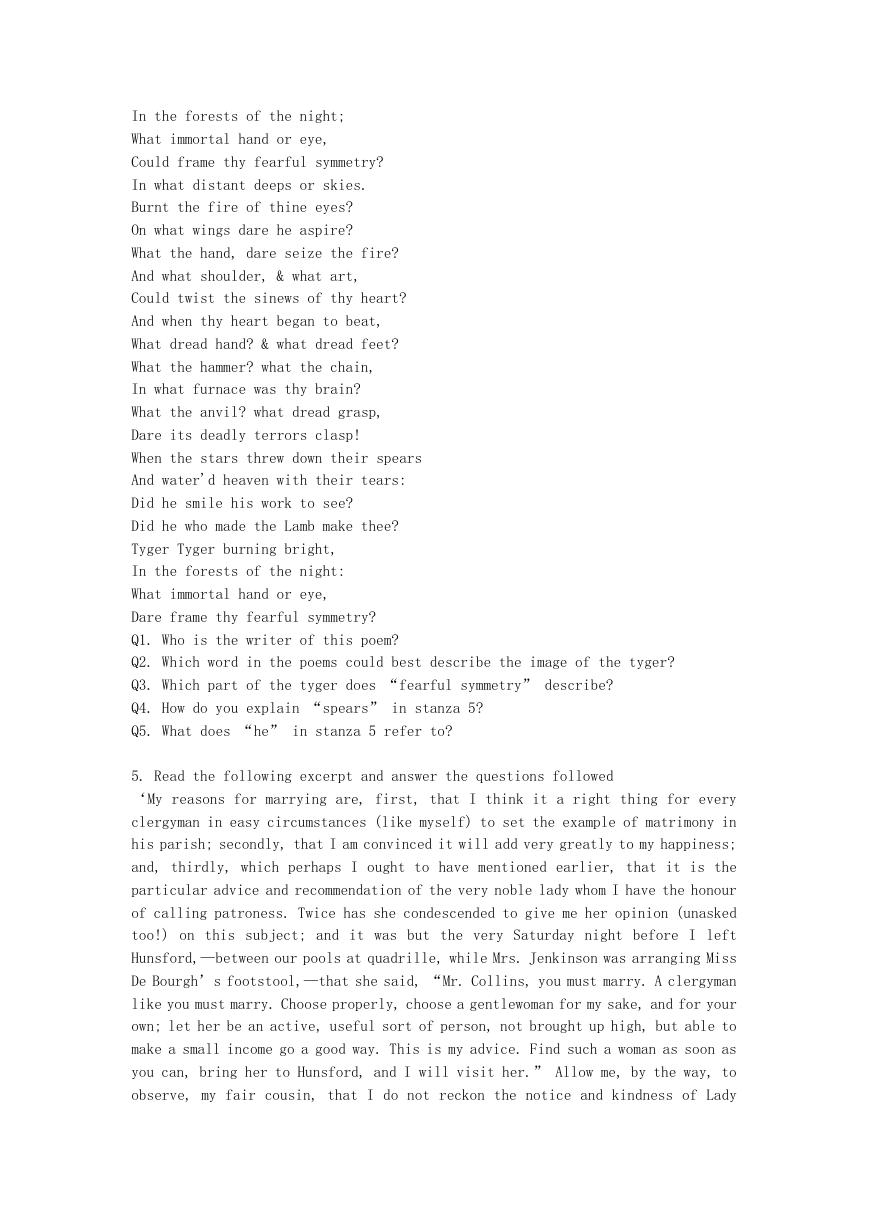
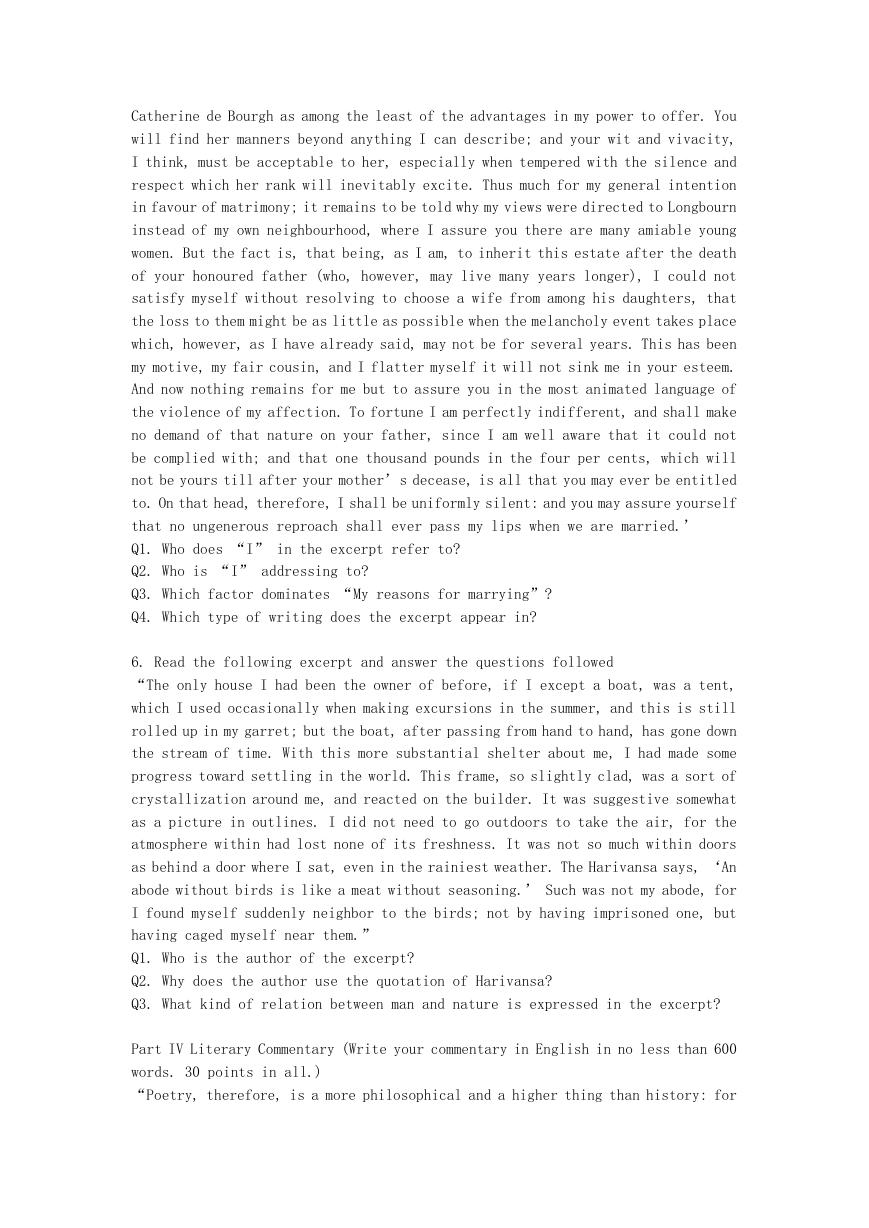
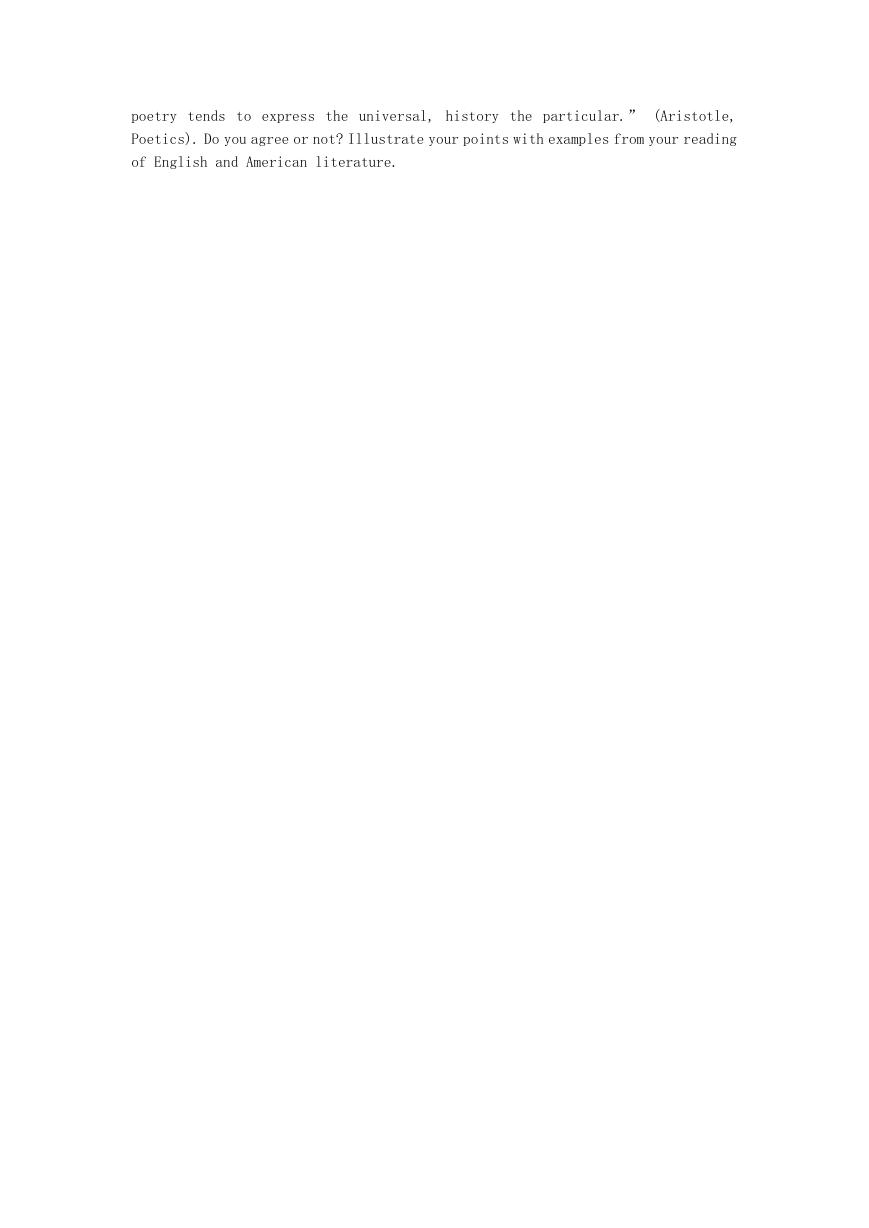






 2023年江西萍乡中考道德与法治真题及答案.doc
2023年江西萍乡中考道德与法治真题及答案.doc 2012年重庆南川中考生物真题及答案.doc
2012年重庆南川中考生物真题及答案.doc 2013年江西师范大学地理学综合及文艺理论基础考研真题.doc
2013年江西师范大学地理学综合及文艺理论基础考研真题.doc 2020年四川甘孜小升初语文真题及答案I卷.doc
2020年四川甘孜小升初语文真题及答案I卷.doc 2020年注册岩土工程师专业基础考试真题及答案.doc
2020年注册岩土工程师专业基础考试真题及答案.doc 2023-2024学年福建省厦门市九年级上学期数学月考试题及答案.doc
2023-2024学年福建省厦门市九年级上学期数学月考试题及答案.doc 2021-2022学年辽宁省沈阳市大东区九年级上学期语文期末试题及答案.doc
2021-2022学年辽宁省沈阳市大东区九年级上学期语文期末试题及答案.doc 2022-2023学年北京东城区初三第一学期物理期末试卷及答案.doc
2022-2023学年北京东城区初三第一学期物理期末试卷及答案.doc 2018上半年江西教师资格初中地理学科知识与教学能力真题及答案.doc
2018上半年江西教师资格初中地理学科知识与教学能力真题及答案.doc 2012年河北国家公务员申论考试真题及答案-省级.doc
2012年河北国家公务员申论考试真题及答案-省级.doc 2020-2021学年江苏省扬州市江都区邵樊片九年级上学期数学第一次质量检测试题及答案.doc
2020-2021学年江苏省扬州市江都区邵樊片九年级上学期数学第一次质量检测试题及答案.doc 2022下半年黑龙江教师资格证中学综合素质真题及答案.doc
2022下半年黑龙江教师资格证中学综合素质真题及答案.doc